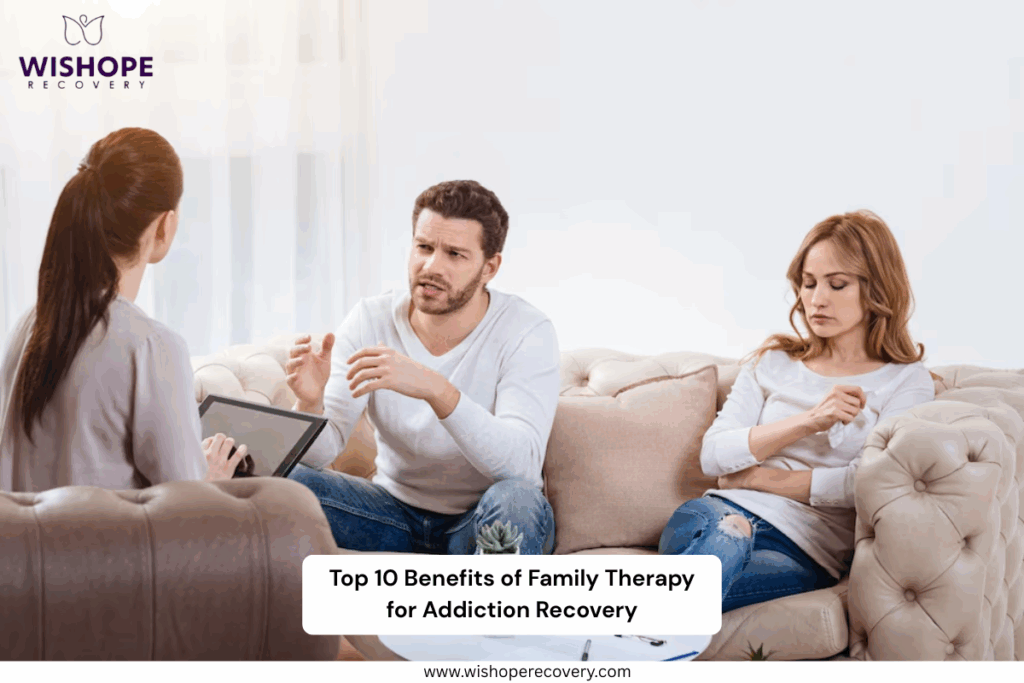When someone is battling addiction, they’re not the only one hurting—the whole family feels it. Relationships get strained, trust is broken, and communication often breaks down. That’s where family therapy steps in. It’s not just about helping the individual recover; it’s about helping the entire family heal and grow stronger together.
Did you know? People recovering from addiction have a much higher chance of long-term success when their families are involved in the process. That’s exactly why family therapy for addiction has become such a powerful part of recovery programs today.
Here are 10 important reasons to make it a priority in your family’s recovery journey.
1. Rebuilds Trust
Addiction often comes with lies, broken promises, and a lot of emotional damage. One of the biggest goals of family therapy in addiction treatment is to slowly and safely rebuild trust. Therapists create a space where everyone can be honest, express their pain, and start over.
2. Improves Communication
When addiction takes over, it’s common for communication to fall apart. Family therapy helps loved ones learn how to talk with each other instead of at each other. It teaches healthy communication skills, active listening, and how to express feelings without blame or anger.
3. Supports the Person in Recovery
Let’s be honest—recovery can feel lonely. When families get involved through family therapy for addiction, the person struggling no longer feels like they’re doing it alone. They feel seen, heard, and supported, which makes a huge difference in staying on track.
4. Identifies Harmful Family Dynamics
Sometimes, family roles or patterns unintentionally feed into the addiction cycle. Maybe it’s enabling, avoidance, or unresolved trauma. In therapy, these patterns are gently brought to light so that everyone can learn healthier ways to relate to one another.
5. Educates Families About Addiction
Many people still see addiction as a “bad choice” rather than a complex mental health issue. Family therapy for drug addiction provides the facts—how addiction affects the brain, what triggers relapse, and how recovery really works. Understanding the “why” helps everyone approach the situation with more empathy.

6. Offers Healing for Everyone
Addiction hurts everyone. Partners, parents, siblings—even kids—often carry deep emotional scars. That’s why family trauma counseling is so important. It gives each family member a voice, a space to heal, and tools to manage their own mental health while supporting their loved ones.
7. Builds Healthy Boundaries
Boundaries can feel uncomfortable at first, but they’re absolutely necessary for recovery. Through family therapy, loved ones learn where to draw the line between supporting and enabling. They bring clarity to relationships and reinforce mutual respect.
Setting limits helps protect emotional energy, encourages independence, and allows everyone to take ownership of their roles. Healthy boundaries also reduce resentment and misunderstandings.
These boundaries protect everyone’s well-being and prevent unhealthy dynamics from returning.
8. Encourages Accountability
Recovery works best when everyone plays their part. Therapy sessions hold both the person in recovery and their family members accountable for how they communicate, behave, and support one another. This shared responsibility helps the whole family grow together.
With a trained therapist guiding the conversation, family members can safely explore difficult topics like blame, guilt, and emotional distance. And instead of finger-pointing, the focus shifts to constructive change.
9. Reduces Chances of Relapse
When someone comes home from treatment, and nothing has changed at home, relapse is more likely. But when families have done the work through family therapy, the home environment becomes a place of safety, structure, and ongoing support.
Through therapy, families learn how to spot early signs of relapse, respond with compassion, and encourage healthy coping skills. They understand the importance of consistency, empathy, and accountability in preventing setbacks.
10. Creates a Stronger Future
Perhaps the most beautiful part of family therapy for drug addiction is that it helps families move from survival mode into a place of strength, resilience, and connection. The tools learned don’t just help during recovery—they last a lifetime.
At WisHope Recovery Center, we’ve seen the power of family involvement in recovery. It transforms lives—not just for the person recovering from addiction, but for the entire family.
Why Families Matter in Recovery
Addiction doesn’t happen in isolation, and recovery shouldn’t either. Whether it’s rebuilding trust, learning how to support without enabling or healing from past trauma, family therapy in addiction treatment brings families back together—stronger and more compassionate than before.
You might be thinking, “But what if my family is too far gone?” or “Is it really worth it?” Absolutely. Healing is always possible. With the right guidance and willingness to show up, every family has a chance to reconnect.
WisHope Recovery Center believes that recovery is a family journey. That’s why we offer family trauma counseling and structured therapy sessions designed to guide families through every step of the process.
Let’s Heal Together – Take the First Step Today!
If you or someone you love is struggling with addiction, don’t wait. Family therapy could be the missing piece that brings real, lasting change—not just for one person but for everyone involved.
Reach out to WisHope Recovery Center today to learn how our team can support your family’s recovery journey.
Searching for “family therapy near me”? We’re here and ready to help.
Call now or schedule a consultation to start healing together. Because every family deserves a second chance, and with the right support, recovery isn’t just possible—it’s powerful.

